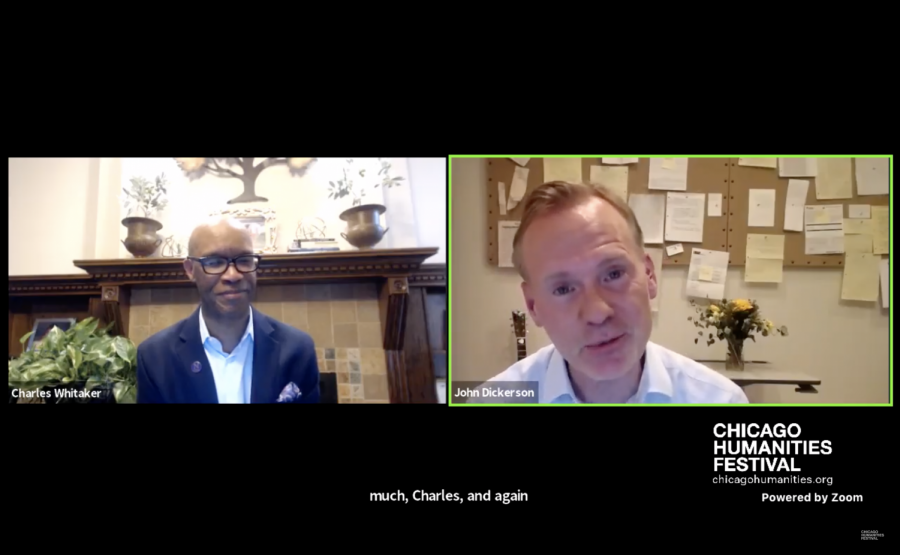John Dickerson says we need to reimagine the presidency
Evan Robinson-Johnson/Daily Senior Staffer
Medill Dean Charles Whitaker interviews 60 Minutes correspondent John Dickerson as part of the Chicago Humanities Festival on June 24, 2020. Dickerson discussed his new book on the role of the United States president.
June 24, 2020
The institutions of the United States, from police forces to commander in chief, are at a critical juncture, and 60 Minutes correspondent John Dickerson thinks they need change — starting by redefining what it means to be president.
Medill Dean Charles Whitaker joined with Dickerson over Zoom Tuesday evening to ask about his latest book, “The Hardest Job in the World: The American Presidency,” and Dickerson’s vision for a more focused form of national leadership. The conversation was part of a new digital series by Chicago Humanities Festival and aired live on YouTube to a small audience on Tuesday evening.
Dickerson started by describing why he sees the presidency as an “impossible” job. He said he sees modern day presidents as “emergency firefighters,” forced to respond to an overwhelming slate of responsibilities.
“While the to-do list is getting longer, the ability to manage that list is getting harder,” Dickerson said, citing increased threats to national security and the economy and partisan divides in congress.
Presidents have always responded to national emergencies and moments of crisis, but Dickerson believes the pressure has intensified in recent years.
He said that pressure has increased the need for qualified advisors and cabinet members to work alongside the president. Since the role of the presidency has changed, Dickerson said people also need to be asking presidential candidates different questions. Instead of the televised rallies and debates, Dickerson suggests that a debate on paper might be more useful.
“Make the campaign questions about their preparations for office,” Dickerson suggests. “Really what you’re running for is not a single presidency, but you’re running to be head of an organization.”
Modern-day candidates need to be treated more like potential job applicants at an interview, rather than celebrities, he said.
But division of labor isn’t the only necessary change he sees. With the pressures of a pandemic, racial inequality and an economic decline, Dickerson said our next president must also be “consoler-in-chief.”
“Empathy is meaningfully understanding and recognizing the rights and beliefs and opinions of people who are not in your grouping,” Dickerson said. “And as president of the whole country, not just president of your base, that’s what you’re called to do.”
Whitaker and Dickerson both saw a need for empathy in the presidency, referencing the calm demeanor of President Abraham Lincoln and the need to provide clean information in moments of crises.
The discussion was reminiscent of the responses from governors during COVID-19 briefings. While New York Governor Andrew Cuomo has been celebrated as a “heartfelt voice” of reason, President Trump has been criticized for downplaying the threat.
Both journalists, Dickerson and Whitaker also spent a portion of the talk discussing the difficulties reporters face while covering the presidency. Dickerson recalled one interview with President Trump where he was essentially forced to show himself out of the Oval Office. He also described how difficult it is to help readers avoid the distractions and find important stories.
Whitaker ended the conversation asking for more: Is it possible for a president to unite us?
“I think it’s possible,” Dickerson said. “The only real change that’s ever made is when people demand it and the people that do are often highly unpopular. And a president doesn’t want to deal with them at first and then ultimately has to deal with them. And that dance, which is full of suffering and woe and rights denied and equality denied and it breaks your heart, is our story.”
Email: erj@u.northwestern.edu
Twitter: @sightsonwheels



